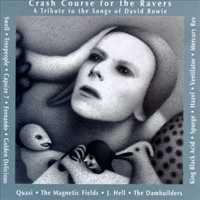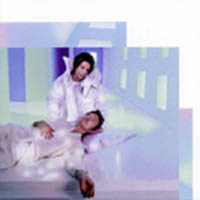 Crash Course for the Ravers
Crash Course for the Ravers
A Tribute to the Songs of David Bowie (Undercover)
by Lex Marburger
It’s been said that nothing can destroy a well-written song. If that’s true, David Bowie has once again proven himself a fucking genius. Although none of the bands featured on Crash Course for the Ravers can be said, by any means, to be my favorite group, the covers are consistently above the level of absolute suck. The album starts with Swell‘s version of the spooky funk classic “Golden Years,” faithfully updated to retain its creepiness. Tree People turn “Andy Warhol” into a listenable grunge tune (imagine that!), while Capsize 7 puts even more Lou Reed into “Queen Bitch” while rocking it at the same time. Golden Delicious throws in one of the album’s strongest shockers – did you know “Suffragette City” makes a great rockabilly tune? Don’t ask, I don’t know how they did it, it just fits right. Fernando makes “Jean Genie” appropriately sneering glam, and Magnetic Fields shows why Bowie was so influential to Goth music by making “‘Heroes'” sound like Joy Division. There are some exceptions to the above-average material, of course, which comment more on the bands than the songs they chose. J. Hell puts forth a miserable acoustic version of “Moonage Daydream,” Spurge has a wankfest they like to call “Width of a Circle,” and Quasi opens “Sound and Vision” with an interesting pseudo-Krautrock intro before sinking into tepidness and apathy. However, Crash Course… takes an enthusiastically ironic twist when Dambuilders jump on “Boys Keep Swinging,” and King Black Acid takes on the almost-forgotten “Always Crashing In The Same Car,” putting a slight Elvis Costello spin on it. Hazel covers a Bowie cover with a Countrified “It Ain’t Easy.” Ventilator achieves the Futuristic, space-age, Man-who-sold-the-World vibe of “After All,” while Mercury Rev ends the album with “The Sun Machine (Memory of a Free Festival),” a psychedelic finish to what can only be considered an eclectic attempt to sum up Bowie’s effect on modern rock music. It is obvious that few bands can match Bowie, but at the same time, it’s pretty clear that if a band just follows the formulas Davy Jones put out, they won’t have to do any of their own thinking. The album is worth a few of your hard-earned bucks, but not too many of them.



